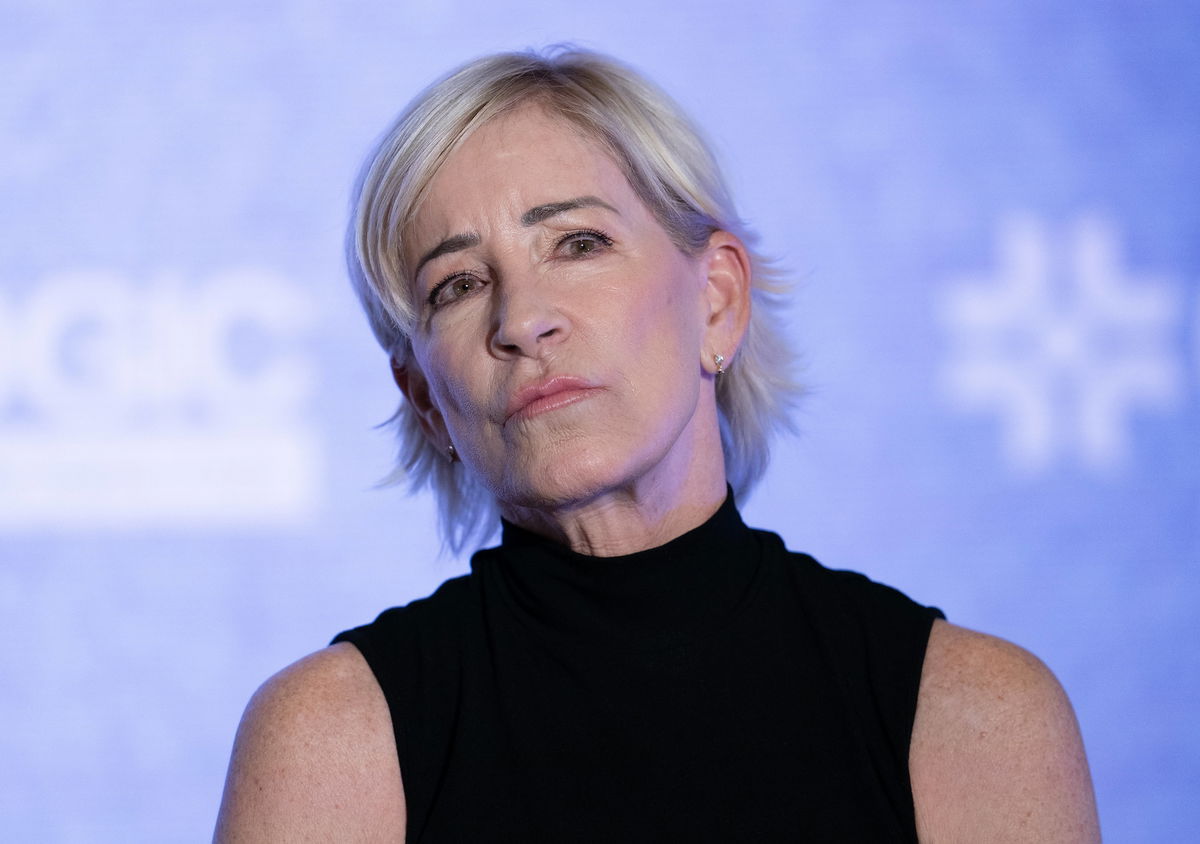
Imago
Tennis: WTA, Tennis Damen Finals Nov 2, 2023 Cancun, Mexico Chris Evert in a joint press conference, PK, Pressekonferenz with Martina Navratilova on day five of the GNP Saguaros WTA Finals Cancun. Cancun ENTER STATE Mexico, EDITORIAL USE ONLY PUBLICATIONxINxGERxSUIxAUTxONLY Copyright: xSusanxMullanex 20231102_jla_au2_167

Imago
Tennis: WTA, Tennis Damen Finals Nov 2, 2023 Cancun, Mexico Chris Evert in a joint press conference, PK, Pressekonferenz with Martina Navratilova on day five of the GNP Saguaros WTA Finals Cancun. Cancun ENTER STATE Mexico, EDITORIAL USE ONLY PUBLICATIONxINxGERxSUIxAUTxONLY Copyright: xSusanxMullanex 20231102_jla_au2_167
The semifinal between Amanda Anisimova and Naomi Osaka was supposed to keep all eyes on the tennis. But instead, Chris Evert’s commentary stole a share of the spotlight. What made it worse for many fans was her perceived bias toward Osaka, something they feel has become a pattern. In the end, the match itself delivered the drama with a 6-7(4), 7-6(3), 6-3 scoreline, but what fans couldn’t stop talking about afterward wasn’t just the scoreline; it was what Evert kept repeating in the booth.
Watch What’s Trending Now!
Osaka came out firing, taking the opening set in a tiebreak behind 15 aces and nearly 70% success on her first serve. Anisimova, by contrast, looked rattled early, her game riddled with errors and tension. But as the match wore on, the American found her rhythm. She clawed back from 3–5 down in the second, hammering Osaka’s second serve and flipping the script with 17 winners and a sharp return percentage that carried her through the tiebreak. By the final set, Anisimova was in full control, breaking early and closing it out 6–3 after almost three hours of tennis.
All the while, though, Chris Evert kept circling back to the same point: Osaka’s mid-match coaching. Even with rule changes that allow sideline guidance, she described the exchanges as a “crutch” and insisted players should “figure it out” on their own. The fixation felt out of step with the current game and increasingly distracted from the contest unfolding on court. But, to be fair, off-court coaching has largely been legalized on the WTA and ATP Tours, and Evert was hardly the first to question it.
Just a week ago, Stefanos Tsitsipas’ father Apostolos was called out for yelling instructions from the stands— a far clearer offense given his reputation for over-involving himself in his son’s matches. Perhaps, fans would have been more forgiving if Evert’s fixation had been aimed at the Greek camp. But in Osaka’s case, the criticism felt misplaced, and while that might have been acceptable once, viewers couldn’t ignore that this was the second time in a single week she had taken an aim at the four-time Slam champion.
Chris Evert takes are very condescending and it’s so annoying- @usopen @espn I mean coaching is literally LEGAL- The top men gets coached play by play- and that’s all she keeps referencing🙄 like we get it, players should figure it out. Noted. Please move on- #OsakavsAnismova
— OGTennisQueen (@Glam_Girl84) September 5, 2025
Just days earlier, Osaka dismantled Coco Gauff in straight sets in the Round of 16. But instead of spotlighting Osaka’s dominance, Evert spent much of that broadcast framing Gauff’s struggles: citing her emotions, a recent serve change, and the “tough week” she’d had, while brushing past the quality of Osaka’s play. Viewers felt the commentary leaned more like consolation for Gauff than recognition of Osaka’s masterclass.
So yes, fans weren’t about to let it slide. Social media lit up almost instantly, with viewers calling out Evert for what they saw as a clear bias:
Fans refuse to listen to Chris Evert as Naomi Osaka and Amanda Anisimova battle at the US Open semifinal
One fan claimed that Evert was pretty annoying. And the reason? According to the fan, Chris Evert seemed stuck at only one reference. The comment read, “Chris Evert takes are very condescending and it’s so annoying- @usopen @espn I mean coaching is literally LEGAL- The top men gets coached play by play- and that’s all she keeps referencing 😕 like we get it, players should figure it out. Noted. Please move on- #OsakavsAnismova.” Another fan added to the sentiment and wrote, “Can someone ask Chris Evert what she thinks about players looking to their coaches for input. I’m not sure we know her opinion after commenting on it 742 times….”
Furthermore, according to some people, she was supporting Osaka a bit more than Anisimova. One fan noted that and wrote, “Is it even possible for Chris Evert to suck up more to Osaka during this match? Just be quiet!” That’s ironic, considering how, not too long ago, fans dissed her for being biased against the Japanese star. “Perhaps you could encourage Chris Evert to call a match with less bias. Renee Stubbs is great. Pam Shriver needs to go,” wrote another netizen.
Meanwhile, one of the fans decided to make a quick suggestion. The comment read, “Chris Evert is fine if she would not have to make an obvious comment after every shot. Take a break.” Whether Evert decides to take more breaks going forward is something we cannot guarantee. But if you don’t want a break from the action at Flushing Meadows, head to EssentiallySports’ live blog of the US Open.


